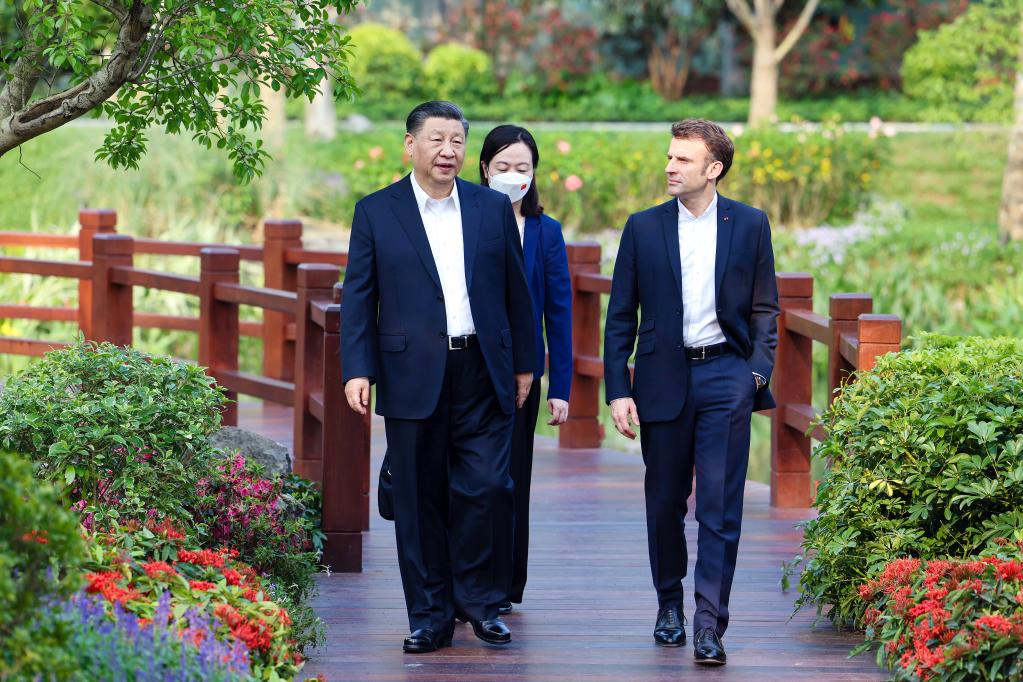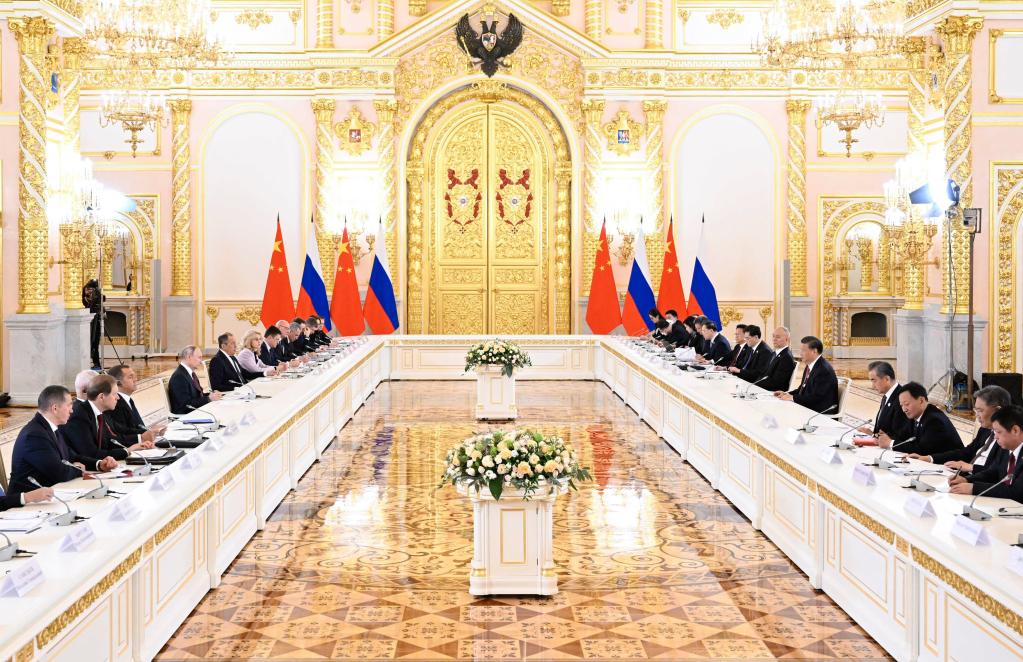An overview of Xi's diplomacy in spring 2023
*China's diplomacy has been in full swing this spring, particularly after China's exchanges with the world resumed in an orderly manner following continued optimization of its COVID-19 response and the successful conclusion of its "two sessions."
*Chinese modernization has been a key term in Xi's meetings with foreign leaders.
*On April 26, Xi spoke to his Ukrainian counterpart Volodymyr Zelensky over the phone. Xi said China will send a special representative of the Chinese government on Eurasian affairs to visit Ukraine and other countries to conduct in-depth communication with all parties on the political settlement of the crisis.
China's diplomacy has been in full swing this spring, particularly after China's exchanges with the world resumed in an orderly manner following continued optimization of its COVID-19 response and the successful conclusion of its "two sessions."
TIGHT SCHEDULE
On March 15, Chinese President Xi Jinping attended the Communist Party of China (CPC) in Dialogue with World Political Parties High-Level Meeting, where he proposed the Global Civilization Initiative, another international public good contributed by China to the world besides the Global Development Initiative and the Global Security Initiative.
On March 20, Xi embarked on a state visit to Russia. This was his first trip abroad after his reelection as Chinese president. He described this trip as a journey of friendship, cooperation and peace.
On March 26, China and Honduras signed a joint communique in Beijing on the establishment of diplomatic relations after the Central American country cut the so-called "diplomatic relations" with Taiwan. Chinese State Councilor and Foreign Minister Qin Gang said President Xi attaches great importance to China-Honduras relations and that China welcomes President Castro to visit China as soon as possible.
On March 31, Xi met with the prime ministers of Spain, Malaysia and Singapore respectively. Xi and the foreign leaders pledged to strengthen ties and cooperation.
On April 6, Xi held a trilateral meeting with French President Emmanuel Macron and European Commission President Ursula von der Leyen in Beijing. Xi pointed out that the concurrent visit to China by Macron and Von der Leyen demonstrated the positive desire of the EU to grow relations with China and advance the common interests of China and the EU.
On April 14, Xi held talks with his Brazilian counterpart Luiz Inacio Lula da Silva in Beijing. The Brazilian leader headed a large delegation on his first visit outside the Americas since being elected President last year.
On April 19, Xi held talks with President of the Gabonese Republic Ali Bongo Ondimba, the first African head of state to visit China after Xi was reelected as the Chinese president. The two leaders decided to upgrade bilateral ties to a "comprehensive strategic cooperative partnership."

Chinese President Xi Jinping holds talks with President of the Gabonese Republic Ali Bongo Ondimba at the Great Hall of the People in Beijing, capital of China, April 19, 2023. (Xinhua/Li Xueren)
On April 24, Xi received the credentials of 70 ambassadors to China at the Great Hall of the People in Beijing. Xi said he hoped that ambassadors will have a comprehensive and in-depth understanding of China and serve as envoys of friendship and bridges of cooperation.
Indeed, China has hosted a number of dignitaries since the start of the year, which shows the eagerness of countries to develop friendly ties with China. These dignitaries include presidents of the Philippines, Turkmenistan and Iran, Cambodian Prime Minister Hun Sen and Belarusian President Alexander Lukashenko.
CHINA OPPORTUNITIES
Chinese modernization has been a key term in Xi's meetings with foreign leaders.
"China is now promoting high-quality development and high-standard opening up, and advancing national rejuvenation on all fronts through a Chinese path to modernization. This will unlock new opportunities for Brazil and countries around the world," Xi told Lula.
Noting his delightful visit to Huawei where he met Chinese business representatives, Lula expressed deep admiration for China's 5G progress and his hope to expand Brazil-China cooperation in relevant fields. He welcomed Chinese investment in support of Brazil's digital transformation and low-carbon development.
After their talks, the two presidents witnessed the signing of various bilateral cooperation documents on trade and investment, digital economy, scientific and technological innovation, information and communications, poverty reduction, quarantine, space and other areas.
Besides their talks in Beijing, Xi had an informal meeting with Macron in the southern Chinese city of Guangzhou, a locomotive for high-quality development, where Xi briefed Macron on the essential features and core elements of Chinese modernization.
"We have full confidence in China's future development. We welcome France to continue to actively participate in the China Import and Export Fair, the China International Import Expo, and the China International Fair for Trade in Services to further expand the Chinese market," Xi said.

Chinese President Xi Jinping and French President Emmanuel Macron stroll through the Pine Garden, chatting and stopping at times to enjoy the unique scenery of the southern Chinese garden, in Guangzhou, south China's Guangdong Province, April 7, 2023. (Xinhua/Liu Bin)
The two sides should work with each other to stay away from the trap of economic decoupling and severing supply chains, Macron said.
The EU and China are each other's important trading partners and the two economies are highly intertwined, Von der Leyen said in Xi's meeting with her and Macron, adding that decoupling from China is neither in the EU's interests nor the EU's strategic choice.
Singapore hopes to take the opportunity of completing the negotiations on upgrading the Singapore-China free trade agreement to send a clear message of China's continued opening up and Singapore's commitment to further deepening cooperation with China, Prime Minister Lee Hsien Loong said.
UKRAINE CRISIS AND OTHER INTERNATIONAL ISSUES
On April 26, Xi spoke to his Ukrainian counterpart Volodymyr Zelensky over the phone. Xi said China will send a special representative of the Chinese government on Eurasian affairs to visit Ukraine and other countries to conduct in-depth communication with all parties on the political settlement of the crisis.
The phone talk was widely welcomed in the international community. The United Nations expects China to continue to play a helpful role in resolving the Ukraine crisis, Farhan Haq, deputy spokesman for UN Secretary-General Antonio Guterres, told a press conference.
The latest development followed the Xi-Putin exchange on the Ukraine issue in March. "A review of history shows that conflicts in the end have to be settled through dialogue and negotiation," Xi said. For his part, Putin said Russia has carefully studied China's position paper on the political settlement of the Ukraine issue and is open to talks for peace.

Chinese President Xi Jinping and Russian President Vladimir Putin hold large-group talks at the Kremlin in Moscow, Russia, March 21, 2023. (Xinhua/Shen Hong)
In February, China released The Global Security Initiative Concept Paper and China's Position on the Political Settlement of the Ukraine Crisis, which demonstrate clearly that China always stands for peace and dialogue, contributing wisdom to resolving the crisis.
China's position boils down to supporting talks for peace, Xi stressed in his meetings with foreign leaders, calling for efforts to forge a balanced, effective and sustainable European security architecture.
Von der Leyen and Macron said that they appreciate China's efforts to promote a political settlement and look forward to China playing a more important role. They also said that they are prepared to work with China to find a way to facilitate talks for peace.
Another landmark in China's diplomacy is mediating talks between Saudi Arabia and Iran. Both countries agreed to restore diplomatic relations and reopen their embassies and missions within two months after their talks concluded in Beijing on March 10.
Observers said the deal sets a good example for how countries in the region can resolve disputes and differences through dialogue and consultation, and represents the contribution that China, as a responsible major power, can make to a turbulent world.








